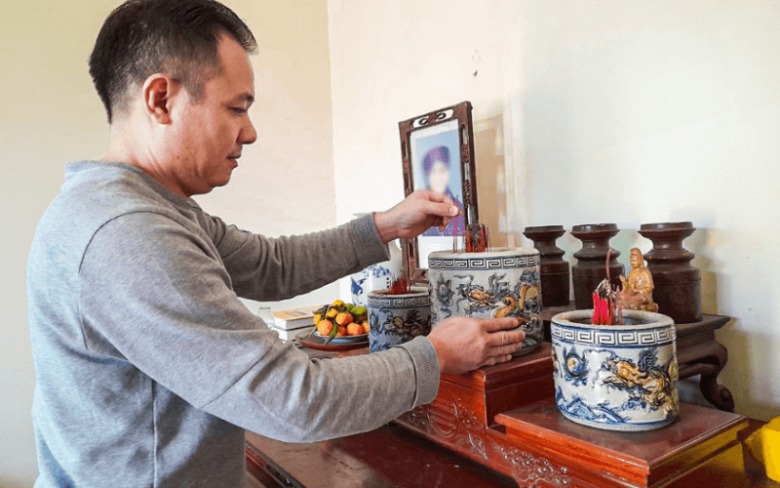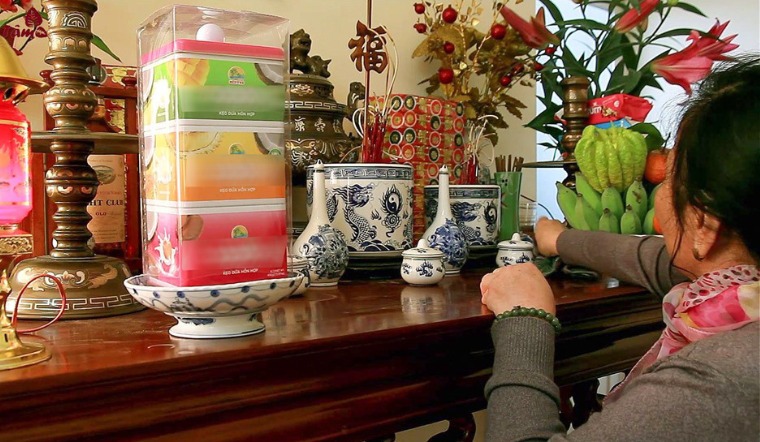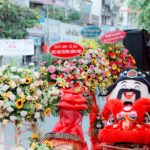Throughout the year, maintaining cleanliness in the ancestral altar space is always something that every family should pay attention to. Especially at the end of the year, maintaining and repainting the ancestral altar becomes more important than ever.
This action not only shows the respect of descendants towards their ancestors, but also carries a significant meaning, symbolizing careful preparation to welcome the new year with luck, as well as to make the ancestral altar more prosperous.

Usually, the regular maintenance of the ancestral altar is performed after the full moon on the lunar month of Chạp, especially during the occasion of the worship of Ông Công – Ông Táo on the 23rd lunar day. In addition, depending on specific circumstances, families can choose other times such as the spiritual day of the 12th lunar month.
However, according to the recommendation of Feng Shui expert Phùng Gia, the most important thing is to choose the timing on February 4th (the 25th day of Chạp). This is the time of the Spring Equinox, marking the transition from the 8th cycle to the 9th cycle, which has a great significance in supporting prosperity and luck for the family.
According to the sharing of Feng Shui expert Phùng Gia, there are some important things to note when performing the maintenance of the ancestral altar:
The Master of the Ceremony and the Maintenance of the Ancestral Altar: In tradition, it is often believed that the owner of the altar, the person responsible, will perform the maintenance for the ancestral altar. However, in the case of private homes, the host of the ceremony is the most important person.

The sincerity of the host is the most important thing in every spiritual ritual. The maintenance of the ancestral altar can be performed by the owner, but it is advisable to choose an experienced person, especially someone who regularly takes care of the worship space. During the process, they should wear modest and tidy clothing to avoid breaking the altar items.
The Ancestral Altar Maintenance Water: Traditionally, many places recommend using clean water, rainwater, or water boiled from leaves such as betel leaves, ginger, star anise, cinnamon… However, using cleaning water to wipe the ancestral altar is not always the optimal choice. On the contrary, using holy water or specialized maintenance water not only helps purify the spiritual energy but also brings a pleasant fragrance.
Arranging Worship Items: For worship items, the preparation can be flexible depending on the conditions and preferences of the host. Items such as boiled meat, sticky rice, fruits, tea, wine, and gold coins can be arranged as desired. For families who worship Buddha, it is advisable to limit salty worship items. During the maintenance process, the person carrying it out should follow the sequence of placing the worship items and lighting incense, asking for permission from the deities and ancestors before cleaning.
Moving Worship Items and Taboos: During the cleaning process, many people have the habit of moving the worship items away from the altar to facilitate cleaning. However, Feng Shui experts recommend that this can violate Feng Shui principles and disturb the order of the altar. Therefore, the person performing the maintenance should pay attention to maintaining the position of the worship items and avoid moving them arbitrarily.
Experience and Thorough Preparation: The person performing the maintenance of the ancestral altar should have experience in taking care of the worship space. If not, before performing the maintenance, they should consider the layout of the worship items to move them gently and easily during the cleaning process.
These notes help ensure that the maintenance of the ancestral altar is carried out correctly, respecting traditions, and maintaining the sacredness of the spiritual space.
2023 Lunar New Year Gift Ideas for Older Family and Friends
As 2021 approaches, families worldwide are gathering to celebrate the special bond between grandparents and their grandchildren. To show their love and admiration, these thoughtfully chosen gifts will bring a smile to the face of the elderly. Here, we have compiled a list of the 13 most meaningful Tet presents that can bring joy to our beloved grandparents.
Exploring the Customs and Traditions of the Vietnamese Doan Ngo Festival Celebrated in Families
The Lunar new year marks an important holiday in Vietnamese culture, and has roots stretching back to the ancient Eastern world. As families come together to experience the celebrations of Tet Doan Ng?, let’s explore seven of the most significant traditions that they engage in, each of which promises to bring prosperity and contentment.





































